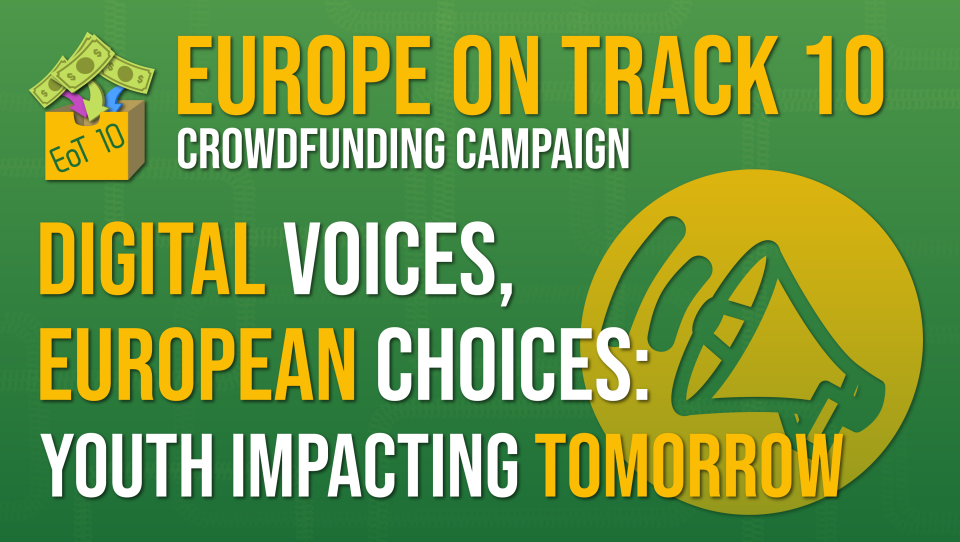
The phrase “Think globally, act locally” was reoccurring through the interviews, describing well the atmosphere in Kyiv. It’s clear that the events in 2013 shaped the people of the country a great deal, empowering them and enforcing the idea that each individual matters and can make a change.
Arriving early as 7am, we were impressed that three people awaited us at the train station. They took us directly to our host, Ksenia, who was also Team Blue in last year’s edition. There we were able to rest well and shower before heading into the day at noon. With lovely weather greeting us, we headed to the park for interviews, as well as being interviewed ourselves by a local channel. From there we went for lunch at a place serving everything in jars, giving us a taste of the hipster side of Kyiv.
We were fortunate enough to get a meeting with Iryna Bieliaieva, head of Youth Policy Department under the Ministry of Youth and Sports of Ukraine. It was invaluable to see the point of view from a higher level, and the efforts that they are putting in. Ms. Bieliaieva defines civic education as something that aims to make youth more active, more responsible, and believe more in their own force. She mentioned that whilst the youth were willing to help, they weren’t equipped with the skills to express their needs and that’s why the state is currently focusing more on civic education. The ministry has set up several working groups of youth throughout the country as well as mobilising Youth Councils. Although struggling to reach out to young people and achieving a truly representative group, it seemed to us that they care about getting the youth’s opinion and that a lot of improvements are being made.

Whilst enjoying Ukrainian cuisine, we got a chance to taste some Georgian food for dinner, adding a new flavour to the trip. After the dinner we watched the AEGEE movie: “Art of the Possible” that Team Red had enjoyed a few nights before us, with couple of the “stars” of the movie present in the room.
Visiting a university the day after was very interesting. As the group was quite small, consisting of 12 people, we were able to have intimate discussions and everybody’s point of view well heard. Asking about education, many university students we spoke to were highly critical of their education, noting that the information was outdated and enforced stereotypes. It was clear that majority wants reforms and more ambitious programs for the students.
“Education in Ukraine deserves to be better and a lot of things have to be improved. Education is concentrated on learning theory and not practical knowledge that’s needed for our careers and our lives”” – Yuliya Obidina, 26
“Well, the education in school is all about being very formal, not being creative, not doing what you want but what they tell you to do, not being able to understand what is freedom, or civic rights; we know nothing about it” – Ruslan Butuzov, 28
On the last day we visited the Reanimation Package of Reforms, which has brought together 65 leading Ukrainian civil society organisations, working on reforms in Ukraine and proving how active citizens’s energy can be channeled into constructive cooperation for the sake of improvement. As they mentioned themselves, after the Revolution of Dignity, Ukraine has been living through the most difficult years of its contemporary history. Russian military aggression, economic decline and non-eradicated corruption, and it is under such conditions that the Ukrainian civil society has demonstrated that it can quickly and effectively mobilise and unite for the greater good.

“One big problem is economic growth due to corruption, another one is the environment due to Tchernobyl and we are not doing many things for that. Of course, when we are having war, many things cannot be developed.” – Valeriia Radchenko, 26
After introducing them to AEGEE and Europe on Track, we engaged them in a fishbowl discussion, where only the people inside the circle are given the word while the others listen; whilst having a chance to tap someone on the shoulder and enter the circle. We spoke about the difference that an individual can make, and heard some truly inspiring stories from the participants, and their views of civic education and its prospects. To many, the problem of civic education seemed to be that there’s not enough people of the older generation that know civic education well enough to teach it, and there’s a need to teach the educators – or as Valeriia stated: “A really good person, a teacher, can inspire you to do more in your life”

We ended our stay with a picnic in the park with AEGEE-Kyiv members, as well as we were joined by our new friends that had been present in the workshop earlier that day. There we were able to interview more people under the sun, getting the last opinions before hopping on the train to Moskva.
Thank you AEGEE-Kyiv for hosting us, and see you somewhere in Europe!
Get a closer glimpse of our trip here:
Written by Rut Einarsdóttir, Photos by Dmitrii Shismarev, Video by Jorge Sánchez Hernández


